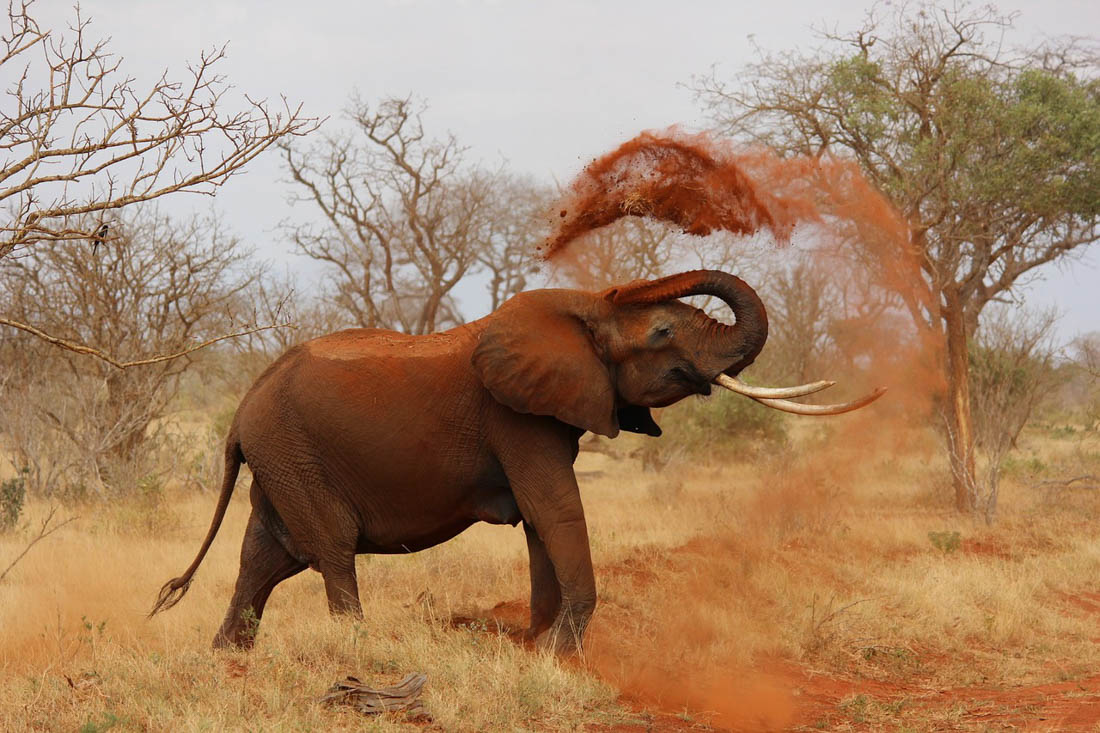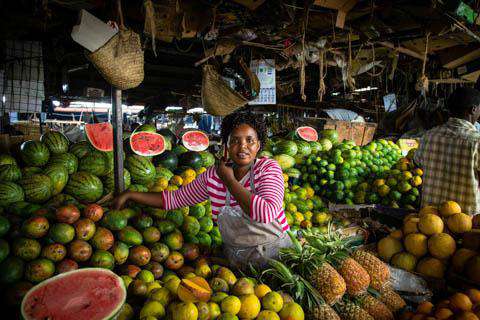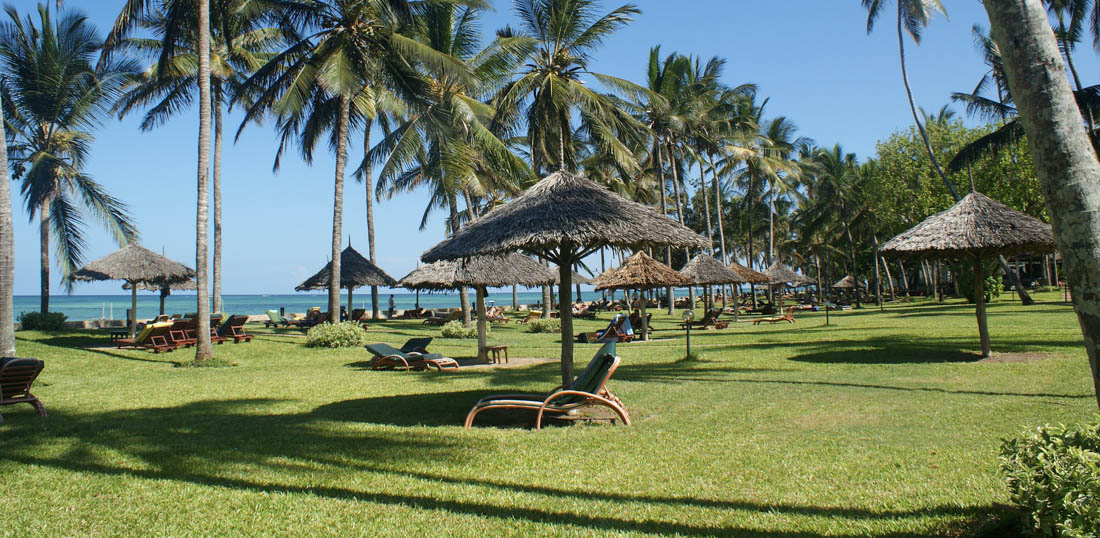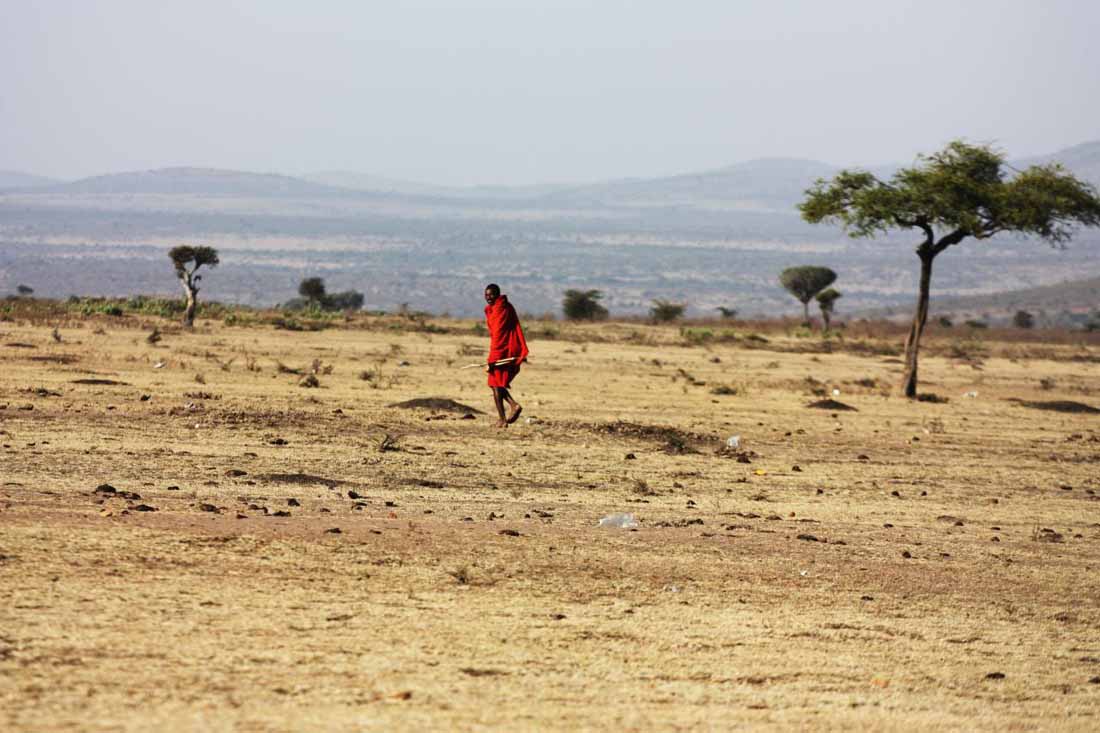Kenya is an amazing country known for its beauty, culture, food, and exciting activities. To help plan your trip within your budget, our travel cost guide has everything you need for your journey. With tips and prices for hotels, food, activities, and transit, you can enjoy every moment without worrying about your budget.
How much does it cost to travel to Kenya?
You should plan to spend around $140 (KES18,096) per day on your vacation in Kenya. This is the average daily price based on the expenses of other visitors.
Past travelers have spent, on average for one day:
- $46 (KES5,895) on meals
- $33 (KES4,304) on local transportation
- $66 (KES8,487) on hotels
A one week trip to Kenya for two people costs, on average, $1,961 (KES253,344). This includes accommodation, food, local transportation, and sightseeing.
All of these average travel prices have been collected from other travelers to help you plan your own travel budget.
-
One Week
Per person
$980
KES126,672
-
2 Weeks
Per person
$1,961
KES253,344
-
One Month
Per person
$4,201
KES542,880
-
One Week
For a couple
$1,961
KES253,344
-
2 Weeks
For a couple
$3,921
KES506,688
-
One Month
For a couple
$8,403
KES1,085,760
How much does a one week, two week, or one month trip to Kenya cost?
A one week trip to Kenya usually costs around $980 (KES126,672) for one person and $1,961 (KES253,344) for two people. This includes accommodation, food, local transportation, and sightseeing.
A two week trip to Kenya on average costs around $1,961 (KES253,344) for one person and $3,921 (KES506,688) for two people. This cost includes accommodation, food, local transportation, and sightseeing.
Please note, prices can vary based on your travel style, speed, and other variables. If you're traveling as a family of three or four people, the price per person often goes down because kid's tickets are cheaper and hotel rooms can be shared. If you travel slower over a longer period of time then your daily budget will also go down. Two people traveling together for one month in Kenya will often have a lower daily budget per person than one person traveling alone for one week.
A one month trip to Kenya on average costs around $4,201 (KES542,880) for one person and $8,403 (KES1,085,760) for two people. The more places you visit, the higher the daily price will become due to increased transportation costs.
Independent Travel
Traveling Independently has many benefits including affordabilty, freedom, flexibility, and the opportunity to control your own experiences.
All of the travel costs below are based on the experiences of other independent travelers.
Is Kenya expensive to visit?
Kenya is a moderately priced destination to visit. It's about average with most other countries for travel costs. The prices for food, accommodation, and transportation are all fairly reasonable.
Within Africa, Kenya is moderately priced compared to the other countries. The overall cost of travel here is comparable to Uganda or Swaziland.
Kenya boasts a wide variety of attractions and accommodations, catering to visitors with different budgets and travel styles. Budget-conscious travelers will appreciate hostels in Nairobi, Diani, and Mombasa, but there are also luxurious hotel options, plus mid-range stays perfect for families or couples.
Sure, Kenya can cost a lot, but with smart choices like eating at less expensive restaurants and enjoying free activities, you can stretch your budget further.
On average, budget travelers spend $59 (KES7,628) per person per day, mid-range travelers spend $140 (KES18,096) per day, and luxury travelers spend around $300 (KES38,789) per day. These costs are calculated from the expenses of previous travelers to Kenya.
For more details, see Is Kenya Expensive?
How much money do I need for a trip to Kenya?
The average Kenya trip cost is broken down by category here for independent travelers. All of these Kenya travel prices are calculated from the budgets of real travelers. Also, you can see more details at How much does a trip to Kenya cost?
Kenya on a Budget
|
Category
|
Budget
|
Mid-Range
|
Luxury
|
Accommodation 1
For 1 person in double occupancy
|
$14
(KES1,808)
|
$33
(KES4,244)
|
$68
(KES8,821)
|
|
Local Transportation 1
|
$14
(KES1,758)
|
$33
(KES4,304)
|
$78
(KES10,041)
|
|
Food 2
|
$18
(KES2,384)
|
$46
(KES5,895)
|
$109
(KES14,102)
|
|
Entertainment 1
|
$16
(KES2,048)
|
$39
(KES5,102)
|
$96
(KES12,434)
|
|
Alcohol 2
|
$3-10
(KES422-1,267)
|
$8-25
(KES1,059-3,178)
|
$20-61
(KES2,625-7,874)
|
 Tsavo National Park, Kenya
Tsavo National Park, Kenya
Realistic Expectations for Your Travel Budget
It's essential to have a grounded and realistic perspective on your budget. While many believe they can travel as "budget" travelers on a mere $59 a day like a backpacker, the reality is that most people struggle to enjoy that style of travel. Consider what makes you happy and how you've traveled before. Do you prefer the comfort of resorts, the convenience of vacation rentals, or the simple camaraderie of hostels? Is dining out a top priority for you? Do you plan to visit the major attractions? Your answers to these questions will certainly impact your overall travel budget.
What is a budget traveler, anyway?
Many people might hear that you can explore Kenya for just $59 a day, but if you're not ready to sacrifice some comforts, be prepared to spend quite a bit more.
Backpackers often manage to stick to this tight budget, but it usually means sleeping in hostel dorms, dining at the cheapest eateries or grabbing fast food, relying on public transport or walking everywhere, and limiting themselves to free attractions.
Fortunately, Kenya has a large number of hostels. You'll find the greatest concentration in Nairobi, Diani, and Mombasa.
Do You Fit the Profile of an Average Traveler?
If you're traveling as a couple or family, you'll probably want to stay in a mid-range hotel, enjoy meals at popular restaurants, and visit major museums and attractions that require entry fees. You'll want to visit the major attractions, sights, and landmarks. After all, most activities do come with a price tag. With that in mind, you should realistically plan for a daily budget of about $140 per person.
There are a wide range of hotels and vacation rentals in Kenya. If you're traveling with others, you'll share your hotel with a partner, friend, or your children, so costs will be split accordingly, saving money. In places like Nairobi and Lamu Island, which are particularly family-friendly, you'll find hotels and restaurants that cater to kids. Also, in Nairobi, The Heron Portico is a good kid-friendly option, and in Lamu Island, Subira House is also terrific. You'll find more hotels that cater to families and couples in our hotel guide for Kenya here.
Looking to Travel in Luxury?
For a trip filled with top-notch service and every possible comfort, expect your budget to reach around $300 per day, per person. Staying in high-end accommodations, enjoying gourmet meals, going on lavish adventures, and hiring personal drivers comes with a luxury price tag. You'll be in the company of the wealthy in locations like Tsavo National Park and Lake Nakuru. Another option would be to splurge on a multi-day high-end tour that takes care of everything for you, such as Kenya: A Classic Safari with Nairobi & Amboseli - offered by Globus.
Accommodation Budget in Kenya
Kenya has a wide range of accommodation prices, and it can be surprising how much prices fluctuate. Budget hotels can often be much cheaper than higher-end places, and during peak season, everything costs much more. For a better deal, try visiting in the low season, and book early to save money.
Calculated from travelers like you
The average price paid in Kenya for two people for a typical double-occupancy hotel room is $66 (KES8,487). For one person sharing a room, the average price paid for a hotel room is $33 (KES4,244) per night. These costs are from the reported spending of actual travelers.
Looking for a hotel in Kenya? Prices vary by location, date, season, and the level of luxury. See below for options.
Local Transportation Budget in Kenya
Calculated from travelers like you
-
On average, past travelers have spent $33 (KES4,304) per person, per day, on local transportation in Kenya. The cost of a taxi ride or rideshare service (Uber/Lyft) in Kenya is significantly more than public transportation.
-
Local Transportation1
Taxis, local buses, subway, etc.
$33
KES4,304
The numbers below highlight common transportation expenses in Kenya, gathered from actual travelers. These prices give a good estimate of what you're likely to spend while getting around the city. However, your personal costs will depend on your travel style, since taxis and hired cars tend to be much pricier than public transportation.
-
Taxi from Airport
KES1,200
Food Budget in Kenya
Calculated from travelers like you
-
While restaurant and meal prices in Kenya can vary significantly, the average cost of food in Kenya is $46 (KES5,895) per day, per person, based on the spending habits of previous travelers.
-
Food2
Meals for one day
$46
KES5,895
When dining out, the average daily cost for food in Kenya is about $46 (KES5895) per person. Previous travelers have typically spent from $18 to $109 per day. Generally, breakfast and lunch will cost less than dinner, but that will vary based on the type of restaurant and what you order.
Typical meal prices in Kenya are as follows:
- Breakfast: $8 to $14
- Lunch: $7 to $23
- Dinner: $16 to $36
- Coffee: $4
- Fast Food or Street Food: $7
In Nairobi you'll find plenty of restaurants of every kind. There are western restaurants that cater to tourists. There are some very high end restaurants with any number of interesting dishes. There is also great street food available throughout the city. It is generally an affordable and safe option. If you're doing a safari then meals are usually included in the price of your tour. The meals are usually quite good and filling. They often include pasta or rice, meat, and vegetables.
Chapati: Chapati is an unleavened, wheat based flat bread that's baked and served as a companion to a main meal. It is similar to roti in India.
Githeri: This is a traditional Kenyan dish made from corn and beans. It's a staple for many Kenyans, particularly those working in agriculture. It's use of beans ensures that it is high in protein and nutritious, while also being filling and plentiful. You may find this dish in more rural areas, but are less likely to stumble upon it on menus in Nairobi.
Kuku Paka: This is a traditional coconut curry dish usually prepared with chicken. It has a delicious, rich flavor and is a good option if you're looking for something a little different.
Traveling with kids? Check for restaurants that offer a childrens menu. It's a smart way to save money, as these meals are often more reasonably priced. And remember, some eateries don't advertise their kids' options, so asking the waiter is a good idea.
Many hotels offer complimentary breakfast, but some charge extra for this service. Prices and quality can vary based on the hotel. Being informed in advance can help you decide whether to indulge in a lavish hotel buffet or simply visit a nearby bakery or café that may offer cheaper options.
Choose to carry a water bottle instead of constantly purchasing drinks. It's a win for both your wallet and the environment.
When arranging for a tour, be sure to confirm which meals are included ahead of time. There may be some meals you'll need to pay for yourself, which could add to your overall costs.
If you're looking to experience the culinary culture in Kenya, taking a food tour or cooking class is a terrific way to do it. After all, cuisine is one of the reasons why so many people visit. Some of the best food-related activities here include:
- Nairobi Nightlife and Safari Park Hotel Dinner Experience for $155 details
- Swahili Street Food Tour for $55 details
- Private Kenyan Cooking Class in Nairobi with a Local for $76 details
- Carnivore restaurant Dinner or lunch from Nairobi for $65 details
Typical prices for food in Kenya are listed below. These actual costs are from real travelers and can give you an idea of the food prices in Kenya. However, your individual costs will vary based on your travel style, selected restaurants, and the items that you order.
Sightseeing and Activities Budget in Kenya
Calculated from travelers like you
-
Sightseeing activities, entertainment, and entrance tickets in Kenya typically cost an average of $39 (KES5,102) per person, per day based on the spending of previous travelers. This includes fees paid for admission tickets to museums and attractions, day tours, and other sightseeing expenses.
-
Entertainment1
Entrance tickets, shows, etc.
$39
KES5,102
A nice way to explore destinations in Kenya is with local tours that last just a few hours. This way you can see as much as possible in an efficient way with knowledgable guides. Prices vary by the type of activity or tour, the dates, and the size of the group. Here are a few of the highest rated tours by previous visitors:
- Day Tour To Kiambethu Tea Farm in Limuru for $115 details
- Nairobi National Park and Giraffe Centre Guided Safari Tour for $60 details
- Nairobi City Guided Walking Tour for $40 details
- Airport Pickup And Nairobi City Tour for $90 details
Listed below are some typical prices for attractions, activities, and entry fees in Kenya, sourced from actual travelers. These costs give you an idea of how much you might spend. However, your personal expenses will depend on the activities you choose, the museums or landmarks you visit, and how frequently you opt for free or low-cost options.
Nightlife Budget in Kenya
Calculated from travelers like you
-
The average person spends about $16 (KES2,119) on nightlife and alcoholic beverages in Kenya per day. The more you spend on alcohol, the more fun you might be having despite your higher budget.
-
Alcohol2
Drinks for one day
$16
KES2,119
Hitting the town is a blast, but easing up on drinks can have a positive impact on your budget.
Nightlife activities and tasting tours are popular in Kenya. A few favorites from other travelers include:
- Mombasa Bar Crawl and Matatu Experience! Pickup from Diani for $35 details
- Mombasa: Coastal Pub Crawl - Bamburi Drunk Tour for $25 details
Traveling in Kenya
 At the market in Nairobi, Kenya
At the market in Nairobi, Kenya
Kenya is located in eastern Africa and is one of the area's hotspots for wildlife safaris. Generally speaking, it's a more affordable option to its southern neighbor, Tanzania, and for that reason, is flooded with visitors every year who are hoping to see some African wildlife. The main wildlife reserve for safaris in Kenya is Masai Mara. Masai Mara is in southwest Kenya and connects to the Serengeti National Park in Tanzania. It is named after the Maasai people who live in the area. The park has a high concentration of lions, gazelles, zebras, and elephants among other animals. The area is probably most famous for the wildebeest migration, known as the "Great Migration" when the animals move from the Kenyan side of the border to the Tanzanian side.
Many people arrange a five day tour which allows visitors to spend several days in Masai Mara and a day or two at Lake Nakuru. Lake Nakuru has many beautiful pink flamingos as well as rhinos, warthogs, and other animals. If time allows, you should definitely venture into some of the less visited national parks and allow yourself a few days to explore the capital city of Nairobi.
If you book a safari, your food and accommodation will likely be included. Food is typically of good quality and quantity. You have several options when booking a safari. Most people choose to arrange the trip before they arrive in Kenya. If you do this you will almost definitely pay a markup for the convenience. It is far more difficult to negotiate a fair price prior to arrival. By booking in advance you do receive the reassurance that your trip is planned, organized, and taken care of. If you are short on time then this can really give you piece of mind.
The other option for your safari is to book your trip after arrival. There are countless vendors that are ready to sell you a safari even as you arrive in the airport. Do your research ahead of time and use only companies that have been recommended to you and have established reputations. Barter hard for the price. They will expect you to negotiate and you can often get the price substantially lower from the original asking price. If you're hoping to get the best deal, you absolutely must wait and book your safari after arrival.
After you've enjoyed a safari, spend a couple days in Nairobi visiting the city. A great option that many people enjoy is a meal at the restaurant Carnivore. It is a splurge, as prices can be extravagantly high, but it offers you a unique opportunity to sample some exotic, local specialties.
At A Glance
- There many different "levels" of safari available. The most budget safaris usually include a group of about five or six tourists who visit the park in a minivan. Accommodation is in "luxury" tents, the driver is the guide and food is prepared by a cook. These are actually surprisingly nice tours. You're just as likely to see the animals whatever you pay for your tour so don't feel obligated to spend more than you need to.
- Most accommodation is located outside of the park. You'll have to pay a substantially higher fee if you're hoping to stay inside the park. It may be worth it for some people though as this is the only way you can see the animals at night or early in the morning when they are more likely to be hunting
- A large percentage of your safari cost goes towards park entrance fees. This is particularly true if you're doing a budget safari. While you should absolutely negotiate on the price of your tour, it is important to realize that the vendor will only go down so far because park rates are set.
- It is recommended that you tip your guide and driver. A ten percent tip is generally appropriate. If your guide does an excellent job, it's a nice gesture to pay a little more. While it's good to negotiate on the price of your package, don't skimp on tipping. Most guides and drivers work hard and are away from their family for long periods of time.
- If you've traveled extensively in Africa you'll likely be surprised by the more modern feel of this country. It has a very solid tourism infrastructure and it's a comfortable place to visit and explore. It can be somewhat of a refreshing change if you're at the tail end of a long trip through Africa.
Related
Looking for a
hostel in Marrakesh,
Cape Town,
Nairobi, or
Zanzibar?
Top Tourist Attractions
Masai Mara: This is the most popular national park in Kenya, Masai Mara is the area's hot spot for safaris, which is one of Africa's most popular travel bucket list items. It's a great place to try and see the "big five". You will likely run into other minivans during your tour, but the wildlife spotting is excellent and it's one of the more affordable parks in Africa.
Lake Nakuru National Park: This is a stunning lake and national park that is a great addition to a safari. It's famous for its flamingos and bird watching. It's often tacked onto the end of a trip to Masai Mara and you will likely spend at least one night near the park.
Mount Kenya: This is Africa's second highest peak and is a challenging but enjoyable climb. The best months to climb are January and February.
We've been gathering travel costs from tens of thousands of actual travelers since 2010, and we use the data to calculate average daily travel costs for destinations around the world. We also systematically analyze the prices of hotels, hostels, and tours from travel providers such as Kayak, HostelWorld, TourRadar, Viator, and others. This combination of expenses from actual travelers, combined with pricing data from major travel companies, gives us a uniqe insight into the overall cost of travel for thousands of cities in countries around the world. You can see more here: How it Works.
 At the market in Nairobi, Kenya
At the market in Nairobi, Kenya




 Budget Your Trip is all about finding out how much everything costs so that you can travel cheaper and longer. Created by avid travelers Laurie and Bryan, our goal is to help you plan your next trip on the right budget. With average daily travel costs that are calculated from the budgets of real travelers, plus an analysis of hotel and tour prices, you can find out how much money you need to plan your next adventure. We also have plenty of travel advice, accommodation reviews, and activity suggestions.
Budget Your Trip is all about finding out how much everything costs so that you can travel cheaper and longer. Created by avid travelers Laurie and Bryan, our goal is to help you plan your next trip on the right budget. With average daily travel costs that are calculated from the budgets of real travelers, plus an analysis of hotel and tour prices, you can find out how much money you need to plan your next adventure. We also have plenty of travel advice, accommodation reviews, and activity suggestions.